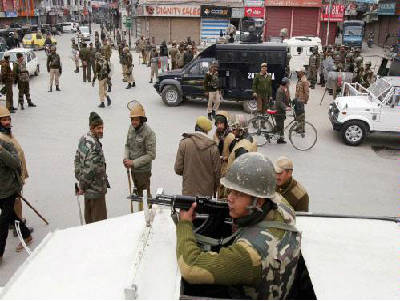 Srinagar, Oct 23: A magisterial probe ordered into the killing of a youth in Baramulla town of Jammu and Kashmir in March has indicted the Army for firing on unarmed and peaceful people without any justification.
Srinagar, Oct 23: A magisterial probe ordered into the killing of a youth in Baramulla town of Jammu and Kashmir in March has indicted the Army for firing on unarmed and peaceful people without any justification.
"Taking into account the evidence that has come up during the inquiry proceedings, it is concluded that on March 5, 2013, the 46 Rashtriya Rifles Army personnel ransacked residential houses and vehicles in Kakar Hamam and Ganai Haman localities without any reason, and subsequently without any justification fired upon unarmed and peaceful citizens that led to the death of Tahir Rasool Sofi and injuries to Mohammad Abbas Lillu," the inquiry report said.
The report, submitted to the state government in August, said warning shots were not fired in the air by the Army that could have scared away the youths, and bullets were fired directly at the youths.
"There seems (to be) no valid reason for the action that was taken by the Army personnel, resulting in the loss of an innocent life and injuries to the teenager who has been rendered handicapped for the rest of his life," the report said.
Sofi's killing sparked massive protests, forcing authorities to clamp curfew in major towns and districts of the Valley.
Additional District Magistrate Baramulla Manzoor Ahmad Qadri, who conducted the probe, in his report dismissed the claims made by Commanding Officer of the Army unit concerned that a group of youths had attacked an Army patrol at a bus stand in the town, creating life-threatening situation for the soldiers and prompting them to open fire.
"The firing incident took place at Kakar Hamam side of the Khanpora Bridge. As such, the statement does not correlate with whatever happened on the ground. The version of the Commanding Officer that there was life-threatening situation for the Army does not seem tenable in view of the fact that all the bridges connecting the two parts of the town had been kept open by the district administration as situation was quite normal in the town," the report said.
The inquiry officer also questioned the authenticity of the photographs submitted by the Army unit to substantiate its claims.
"Some photographs exhibiting boys carrying stones, iron rods and axes were submitted by the Commanding Officer, 46 RR, to depict that the mob had attacked the Army, but no dates are inscribed on them and also, the location where the photographs have been taken cannot be ascertained properly," Qadri said in the report.
"As such, the version of the Army that they fired on the protestors in self-defence after facing a life-threatening situation is ruled out. Evidence is also available to prove that the Army was in control of the Khanpora Bridge and had restricted the movement of civilians on the bridge," he said.







Comments
Add new comment